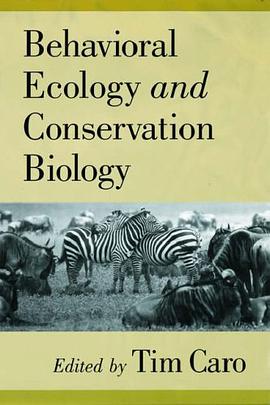

具體描述
In the last few years, a handful of behavioural ecologists, increasingly concerned about species losses, have begun to address issues in conservation biology. Using data collected in the course of their fieldwork on mating systems, foraging behaviour, or habitat preferences, or simply by working on an endangered species, they have started to apply their findings to models of population growth and effective population size, hands-on management, and developing conservation strategies. This edited volume is the first attempt to link these disciplines formally.
著者簡介
圖書目錄
Contents......Page 10
Contributors......Page 14
1 The Significance of Behavioral Ecology for Conservation Biology......Page 20
2 The Role of Individual Identification in Conservation Biology......Page 48
3 Ecological Indicators of Risk for Primates, as Judged by Species' Susceptibility to Logging......Page 73
4 Future Prey: Some Consequences of the Loss and Restoration of Large Carnivores......Page 97
5 A Minimum Intervention Approach to Conservation: The Influence of Social Structure......Page 122
6 Contributions of Behavioral Studies to Captive Management and Breeding of Rare and Endangered Mammals......Page 147
7 Behavior as a Tool for Management Intervention in Birds......Page 180
8 Conspeciflc Aggregation and Conservation Biology......Page 210
9 Reproductive Ecology in the Conservation and Management of Fishes......Page 226
10 Social Organization and Effective Population Size in Carnivores......Page 263
11 Animal Breeding Systems, Hunter Selectivity, and Consumptive Use in Wildlife Conservation......Page 288
12 Conspecific Brood Parasitism, Population Dynamics, and the Conservation of Cavity-Nesting Birds......Page 323
13 The Importance of Mate Choice in Improving Viability in Captive Populations......Page 358
14 Mammalian Dispersal and Reserve Design......Page 386
15 Behavioral Ecology, Genetic Diversity, and Declining Amphibian Populations......Page 411
16 The Management of Subsistence Harvesting: Behavioral Ecology of Hunters and Their Mammalian Prey......Page 466
17 Indigenous Hunting in the Neotropics: Conservation or Optimal Foraging?......Page 491
18 The Evolved Psychological Apparatus of Decision-Making Is One Source of Environmental Problems......Page 518
Afterword......Page 542
19 Behavioral Ecology and Conservation Policy: On Balancing Science, Applications, and Advocacy......Page 544
Epilogue......Page 572
20 How do We Refocus Behavioral Ecology to Address Conservation Issues More Directly?......Page 574
· · · · · · (收起)
Contributors......Page 14
1 The Significance of Behavioral Ecology for Conservation Biology......Page 20
2 The Role of Individual Identification in Conservation Biology......Page 48
3 Ecological Indicators of Risk for Primates, as Judged by Species' Susceptibility to Logging......Page 73
4 Future Prey: Some Consequences of the Loss and Restoration of Large Carnivores......Page 97
5 A Minimum Intervention Approach to Conservation: The Influence of Social Structure......Page 122
6 Contributions of Behavioral Studies to Captive Management and Breeding of Rare and Endangered Mammals......Page 147
7 Behavior as a Tool for Management Intervention in Birds......Page 180
8 Conspeciflc Aggregation and Conservation Biology......Page 210
9 Reproductive Ecology in the Conservation and Management of Fishes......Page 226
10 Social Organization and Effective Population Size in Carnivores......Page 263
11 Animal Breeding Systems, Hunter Selectivity, and Consumptive Use in Wildlife Conservation......Page 288
12 Conspecific Brood Parasitism, Population Dynamics, and the Conservation of Cavity-Nesting Birds......Page 323
13 The Importance of Mate Choice in Improving Viability in Captive Populations......Page 358
14 Mammalian Dispersal and Reserve Design......Page 386
15 Behavioral Ecology, Genetic Diversity, and Declining Amphibian Populations......Page 411
16 The Management of Subsistence Harvesting: Behavioral Ecology of Hunters and Their Mammalian Prey......Page 466
17 Indigenous Hunting in the Neotropics: Conservation or Optimal Foraging?......Page 491
18 The Evolved Psychological Apparatus of Decision-Making Is One Source of Environmental Problems......Page 518
Afterword......Page 542
19 Behavioral Ecology and Conservation Policy: On Balancing Science, Applications, and Advocacy......Page 544
Epilogue......Page 572
20 How do We Refocus Behavioral Ecology to Address Conservation Issues More Directly?......Page 574
· · · · · · (收起)
讀後感
評分
評分
評分
評分
評分
用戶評價
评分
评分
评分
评分
评分
相關圖書
本站所有內容均為互聯網搜索引擎提供的公開搜索信息,本站不存儲任何數據與內容,任何內容與數據均與本站無關,如有需要請聯繫相關搜索引擎包括但不限於百度,google,bing,sogou 等
© 2025 book.quotespace.org All Rights Reserved. 小美書屋 版权所有




















